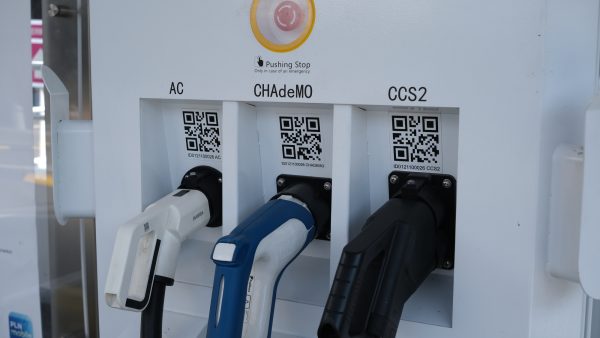
An electric vehicle charging station in East Jakarta, Indonesia, August 18, 2022.
Credit: Depositphotos
When we think of tech in Indonesia, the first thing that usually comes to mind are homegrown unicorns like GoTo and Traveloka, big consumer-facing start-ups that are integral to the country’s rapidly growing digital economy. And for a while, it seemed like this would become a new frontier of global competition, as companies like Uber tried to enter the market and waves of foreign investment underwrote explosive growth. But Uber pulled out, and investors have turned cautious on tech darlings like GoTo. Consumer-facing tech remains important to Indonesia’s economic growth story, but it is not an area of high-stakes geopolitics.
Mastery of cutting-edge industrial technologies, on the other hand, still comes with significant geostrategic and economic advantages, and the acquisition and development of such technologies are both highly competitive and intensely political. In Indonesia, there are signs of sharpening geopolitical competition in technology-intensive sectors such as battery manufacturing, clean energy, and data centers.
Indonesia is set to be a major player in the global clean energy transition, as it holds the world’s largest supply of nickel ore, an important input in the manufacture of batteries. Batteries will be key in a low-carbon future, so Indonesia has leverage here. It has used a series of export bans on unrefined ore to force investment into higher value-added downstream activities like nickel smelting with an eye toward battery and eventually electric vehicle production.
Chinese companies like Tsingshan were some of the first to plow billions into the nickel-rich island of Sulawesi and have built large industrial parks there to process the ore domestically. Chinese battery makers like CATL followed by investing billions in domestic battery production facilities. Indonesian nickel has major strategic value to China, as it does to any country battling for supremacy in global electric vehicle and battery supply chains, and it shows.
Diplomat Brief
Weekly Newsletter
N
Get briefed on the story of the week, and developing stories to watch across the Asia-Pacific.
Get the Newsletter
Although China may have had the first-mover advantage, a wave of foreign investment has followed as South Korean and Japanese auto and battery companies have rushed to catch up with their Chinese competitors by establishing or expanding industrial production in Indonesia. Ford even recently announced it would be part of a $4.5 billion nickel investment project (with a Chinese partner). There is a burgeoning techno-industrial ecosystem anchored by nickel mines and ending in the production of batteries and electric vehicles taking shape in Indonesia, and global powers are jockeying for position.
Geopolitical competition coupled with Indonesia’s bebas-aktif strategy with its “middle way” orientation benefits Indonesia’s techno-industrial ambitions here more so than in consumer-facing tech, as global rivals race to secure access to scarce supplies of nickel. In the process, Indonesia stands to benefit from big FDI inflows and potentially the transfer and mastery of new skills and industrial technologies.
While it appears that China gained a first-mover advantage in nickel, the United States has recently emerged as an important player in clean energy. At the G-20 last November, President Joko Widodo announced the Just Energy Transition Partnership, a $20 billion commitment from development banks, the U.S., Japan, and European allies to invest in clean energy. China was not part of this deal and has not been a major player in Indonesia’s renewable energy sector. Given that Indonesia is one of the world’s largest consumers and producers of fossil fuels like coal, and that electricity consumption in the country is expected to grow strongly in the coming decades, investing in renewable energy now has long-term strategic and economic implications.
Another area of the burgeoning competition is Indonesia’s data infrastructure. China’s Huawei dominates the supply of telecommunications equipment, but the field is more open for data centers and cloud computing. Next generation technologies like artificial intelligence need a lot of computing power and require big investments in back-end infrastructure, and Indonesia has been positioning itself as a regional hub for this physical hardware. Amazon already said it would invest $5 billion over 15 years in data centers and cloud computing infrastructure, while Huawei pledged $300 million over five years. It is likely that competitive investment in this sector will intensify in coming years.
Advertisement
Those who know Indonesia’s economic history know that technology, economic development, and power are deeply intertwined. One reason the Dutch were able to exploit the land, labor, and resources of Indonesia during the colonial period was by monopolizing and restricting access to advanced technologies and know-how. In most cases, Indonesia still lacks the ability to indigenously push the boundaries of the technological frontier. It remains dependent on foreign partners for capital and technology-intensive development.
Nevertheless, there has been a push to capture more of the value added through advanced technology and keep it in Indonesia. This is enabled, in part, by the emergence of a multipolar world and increasing geopolitical competition. Great Power rivals like the U.S. and China looking to expand their spheres of influence must compete to secure market access, investment opportunities and strategic supply chains in countries like Indonesia. And the way to do that is to offer Indonesia the things it really wants like investment in technology-intensive sectors, and transfer of skills and advanced production capabilities.
It’s too early to tell if or how this will translate into long-term mastery of advanced skills and technologies. And there may come a time when Indonesia and other middle powers in the region are forced to pick a side. But that time has not yet come, and for now geopolitical rivalry benefits Indonesia by allowing them to more forcefully ask the question: what’s in it for us?
